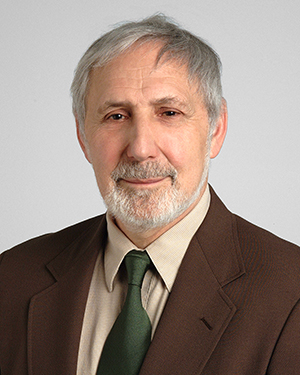Research News
10/14/2022
Cleveland Clinic receives $12 million to investigate how inflammatory cytokines affect cancer progression
A new program funded by a National Cancer Institute grant aims to advance treatments that target the mechanisms tumors use to grow and survive.

The National Cancer Institute recently awarded Cleveland Clinic’s Lerner Research Institute $12 million to define how individual cytokines regulate inflammation and the cells and molecules within and surrounding tumors.
Cytokines produced by many different cell types can affect the success of immunotherapy by enabling an immune response that kills cancer cells. However, such cytokines may also lead to inflammation, creating an environment that encourages cells to mutate and tumors to grow. Gathering detailed information on how cytokines function within specific types of cancer can help navigate the complex pathways tumors use to evade treatment and lead to more effective immunotherapy.
“Despite holding significant potential, immunotherapies only work in a small portion of patients,” says Thomas Hamilton, PhD, Director of Strategic Growth for the Cleveland Clinic’s Chief Research & Academic Office, and a staff member within the Department of Inflammation and Immunity. “We don’t adequately understand why they work in only 20-30% of patients with a particular type of cancer, and the other 70% don’t respond. I think those differences are reflected in the complexity of this research.”
The research program’s projects focus on type I interferon, interleukin-17, oncostatin M and transforming growth factor beta (TGB). Primary investigators for the research program are long-time collaborators including Dr. Hamilton, George Stark, PhD, Department of Cancer Biology; and Mark Jackson, PhD, Department of Pathology at Case Western Reserve University and Associate Director for Education and Training at the Case Comprehensive Cancer Center.
Researchers are examining cytokine effects within specific cancers. Drs. Stark and Hamilton investigate lung cancer, while Dr. Jackson’s project concentrates on triple-negative breast cancer. Differentiating among different types of cancer is essential because treatments that work for one may not be effective in another, Dr. Stark says.
"Originally, cancers were categorized primarily by the organ in which they appeared,” he says. “With molecular analyses, we now realize that there are many different subtypes for each cancer. We can optimize treatment for each individual cancer because we have a much better understanding of the underlying causes."
The program’s results have the potential to translate directly into patient care, supporting the Cleveland Clinic’s approach to individualized and cutting-edge cancer treatments.
“Identifying potential windows for therapy – for the effects of specific cytokines at different times and concentrations – all of those things might enable us to say antagonizing a specific factor or giving a specific treatment at a specific time can be beneficial,” says Dr. Hamilton.
A history of groundbreaking research
The NCI funding, which started in September and runs for five years, is supporting the next step in a decades-long program at the Lerner Research Institute to conduct groundbreaking research on cytokines, immune response and inflammation.
Dr. Stark, also the former chair of the Lerner Research Institute, says he was recruited to the Cleveland Clinic in 1992 to work on cytokine research, specifically interferon.
“There was a whole group of people who were working very importantly on interferon – in what was the relatively early days of understanding how it works and what it was going to be used for and so forth,” he says.
The research going on at the time was “breaking open the field of cytokine biology,” Dr. Hamilton said. Drs. Stark and Hamilton were both involved in the initial grant, awarded in 1994, that evolved into the current research program.
Cytokine research drew in many investigators to Cleveland Clinic over the years, including Dr. Jackson. He and Dr. Stark are long-time collaborators, with Dr. Jackson starting as a postdoctoral fellow in Dr. Stark’s lab and eventually moving into a project lead role.
“There’s been evolution all the way through,” Dr. Stark says. “People appreciate how their different interests can connect and form a program because of all these complexities and the cross-effects that you see in cancer.”
Each project within the program can share data and information, as often individual cytokines overlap or interact with one another, Dr. Hamilton says.
An example: Type I interferon
Type I interferon, the subject of one of the current grant’s projects, illustrates how ongoing basic research is essential to updating clinical approaches.
First identified in the 1950s as a front-line human immune response to viruses, type I interferons were also used in early cancer immunotherapies approved by the FDA. Over the years, researchers saw that using type I interferons produced inconsistent results and shifted away from utilizing the cytokines in cancer treatment.
As more technology and screening techniques became available, researchers continued to learn more about tumors and type I interferons at the molecular level. That information began to clarify why therapies using these cytokines produced varying outcomes.
Researchers found that when type I interferon signals immune response to cancer cells, it needs to be strong enough to kill the cancer cells over a specific amount of time. A weak response could prolong the process, causing long-term inflammation which supports the tumor. Researchers also found that cancerous cells evolved to produce type I interferon, with some relying on specific cytokines to survive.
Established research like this provides broad information on how cytokines function, but the ongoing research can provide specifics for therapeutic targets. That could mean inducing a specific level of inflammation that’s enough to kill the cancer but not trigger tumor survival or knocking out the mechanisms that tumors use to escape the immune system.
In the case of type I interferon, previous research established PD-L1 as a potential target. PD-L1 regulates type I interferon expression in cancer cells, protecting them from cell damage. Influencing that protein could knock out that survival strategy, making therapies like immunotherapy or radiation more successful.
“How you use other modalities in combination with immunotherapy requires the information that we’re obtaining, especially for interferon because that’s such an important regulator of that interaction,” Dr. Stark says.
Featured Experts
News Category
Related News
Research areas
Want To Support Ground-Breaking Research at Cleveland Clinic?
Discover how you can help Cleveland Clinic save lives and continue to lead the transformation of healthcare.
Give to Cleveland Clinic
